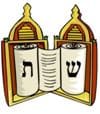
ק׳ ק׳ שׁערי תפילה

*******

לוח זמני תפלה לחורף תשפ״ד
מוצאי שבת | ערבית | שקיעה | מנחה שבת | סוף זמן קריאת שמע | הדלקת נרות | מנחה וקבלת שבת | תאריך | שבת פרשת |
Shabbat Ends | Arbit | Sunset | Minha | Shema before | Candle Lighting | Minha & Kabbalat Shabbat | Date | Parasha |
PM | PM | PM | PM | AM | PM | PM |
|
|
7:05 | 7:01 | 6:14 | 5:40 | 9:19 | 5:59 | 5:59 | 15/16 Mar | פקודי |
שבת
קרבנות
8:45 am
הודו
9:00 am
*****
The Book of Shemot concludes with this Torah portion. After finishing all the different parts, vessels and garments used in the Mishkan, Moshe gives a complete accounting and enumeration of all the contributions and of the various clothing and vessels that had been fashioned. Bnei Yisrael bring everything to Moshe. He inspects the handiwork and notes that everything was made according to G-d’s specifications. Moshe blesses the people. G-d speaks to Moshe and tells him that the Mishkan should be set up on the first day of the first month, i.e., Nissan. He also tells Moshe the order of assembly for the Mishkan and its vessels. Moshe does everything in the prescribed manner. When the Mishkan is finally complete with every vessel in its place, a cloud descends upon it, indicating that G-d's glory was resting there. Whenever the cloud moved away from the Mishkan, Bnei Yisrael would follow it. At night the cloud was replaced by a pillar of fire.
Ohr Somayach Institutions www.ohr.edu

ימי הפורים – משלוח מנות
ובגמרא במסכת מגילה (דף ז). אמרו, משלוח “מנות” שתי מנות לאיש אחד. “ומתנות לאביונים”, שתי מתנות לשני בני אדם. (כי מיעוט “מנות”, שתים, מנה אחת ועוד מנה. ומיעוט “מתנות”, שתים, מתנה ועוד מתנה אחת. וכן מיעוט “אביונים” שתים. שכן לא נאמר “משלוח מנה איש לרעהו ומתנה לאביון).
ומכיון שטעם מצוה זו הוא כדי להרבות אהבה בין אדם לחבירו, ובין אשה לרעותה, לכן, השולח משלוח מנות ואין המקבל יודע ממי קבלם, אין הנותן מקיים בזה מצות משלוח מנות, שהרי מכיון שאינו יודע ממי קבלם, אין כאן חיבה וריעות.
ודבר זה הוא שונה ממצות צדקה שאנו רגילים בה בכל ימות השנה. שהרי במצות צדקה, מצוה מן המובחר שלא יהיה המקבל יודע ממי קיבל, וגם שלא יהיה הנותן יודע למי הוא נותן, מה שאין כן לגבי מצות משלוח מנות, שחובה היא שידע המקבל ממי קבל, בכדי שתכנס בלבו אהבה לחבירו.
ומכיון שעיקר טעמה של מצות משלוח מנות, הוא כדי שיהיה לכל אדם מה לאכול בסעודת הפורים, לכן השולח לחבירו מתנות שונות בתורת משלוח מנות, וכגון ששולח לו בגדים או סדינים וכיוצא בזה, אינו יוצא ידי חובת משלוח מנות. ואפילו אם שולח לחבירו מעות (כסף) בכדי שיוכל חבירו לקנות מנות של מאכלים, אינו יוצא ידי חובתו, שצריך לשלוח דוקא מנות של מאכל ומשקה. ולכן גם השולח לחבירו טבק להרחה וכדומה, אינו יוצא ידי חובת משלוח מנות.
The Days of Purim and the Laws of Mishloach Manot
The Days of Purim
There are four primary Mitzvot on Purim: Megillah reading, Mishloach Manot, Matanot La’Evyonim, and the Purim Feast.
The Mitzvah of Mishloach Manot
The verse in the Megillat Esther (9, 22) states: “In order to mark them as days of feasting and merriment and sending portions (Mishloach Manot) to one another as well as giving gifts to the poor (Matanot La’Evyonim).” The Gemara in Masechet Megillah (7a) states that “Mishloach Manot” refers to sending two food portions to one person while “Matanot La’Evyonim” refers to giving two gifts to two people, i.e., one gift per person. (This is because “Manot” refers to at least two portions, “Matanot” refers at least two gifts, and “Evyonim” is at least two poor people. The verse does not say, “Sending a portion to one another as well as giving gifts to a pauper”).
The Reason for This Mitzvah
The underlying reason for this Mitzvah is that when one sends one’s friend a gift, one expresses feelings of fondness for him and by doing so, one plants feelings of camaraderie in the friend’s heart for himself as well. Additionally, there are those who truly lack financial means and they may be ashamed to ask for assistance for the necessities of the Purim feast; thus, when one sends one’s friend this “Mishloach Manot” in a respectable fashion, the friend will not be ashamed to accept it at all, and he will thus be able to partake of the Purim feast amid much joy.
Since the fundamental reason for this Mitzvah is to create friendship between man and his fellow, if one sends Mishloach Manot to one’s friend and the recipient does not know who the sender is, the sender has not fulfilled his obligation, for being that the recipient does not know who he received this gift from, there is subsequently no friendly bond formed.
This Mitzvah is different from the Mitzvah of Tzedakah (charity) donated during the rest of the year, for regarding Tzedakah, it is most preferable that the recipient not know whom the donor is and that the donor not know who the recipient is. However, regarding Mishloach Manot, the recipient must know who has sent him this gift, for only in this way will feelings of friendship enter the recipient’s heart.
The Definition of “Two Portions”
The definition of “two portions” is two different food items or a food item and a beverage, such as cake and a bottle of wine. It is customary nowadays to send various kinds of sweets and one will indeed fulfill one’s obligation in this manner. Women must also send Mishloach Manot to their friends.
Since one of the predominant reasons for Mishloach Manot is for people to have food to eat for the Purim feast, if one sends one’s friend such gifts as clothing or blankets as Mishloach Manot, one has not fulfilled one’s obligation. Even if one sends one’s friend a monetary gift such that he will be able to purchase food with it, he has still not fulfilled his obligation, for one can only do so by sending food items or beverages. Thus, one who sends one’s friend snuff tobacco or cigarettes as Mishloach Manot has not fulfilled his obligation.